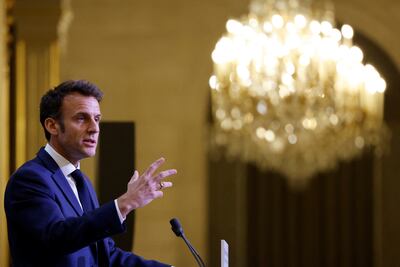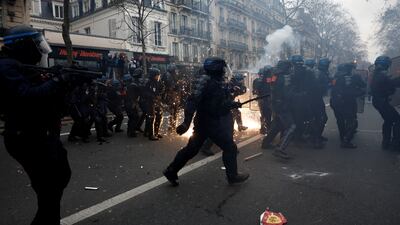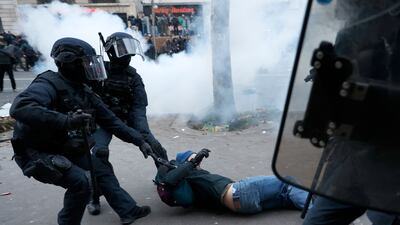France was brought to a standstill on Thursday as workers staged a nationwide strike to protest against President Emmanuel Macron’s flagship pension reforms.
Schools were closed, railway stations deserted and power plants affected as France’s biggest unions showed a rare united front.
Under the government’s plans, the pension age will rise to 63 in 2027 and then to 64 in 2030.
France's trade unions called for a mass mobilisation against the reforms. The last time they showed a united front was 12 years ago, when the retirement age was raised from 60 to 62.
Police fired tear gas on the fringes of a street protest in Paris, as people in hoodies and face masks hurled projectiles at their lines.
The unions are hoping for more than a million people to demonstrate in more than 200 cities across France.
But French media have reported that police had prepared for 550,000 to 750,000 protesters, including 50,000 to 80,000 in the capital.
Their goal is that “the strength and the number of demonstrators can make the government step back”, said Yvan Ricordeau, the national secretary of the CFDT union.
“There is a feeling of anger, of injustice, at the way in which the reform has been constructed and presented,” he added.
Mr Macron says the move is necessary to fund the welfare state for an ageing population.
He has offered sweeteners such as a higher minimum pension and exemptions for people who were unusually young when they joined the workforce.

One Macron ally in parliament, Jean-Rene Cazeneuve, said on Thursday that the government was “obliged to act to save our system”.
He criticised the strikers for disrupting the lives of French people already struggling with the difficult economic situation.
“Nobody contests the right to strike but there is a red line — that is blockading the country,” he told French television.
Workers at energy company EDF said they had lowered electricity output by 7,000 megawatts — enough to power two cities the size of Paris. Their union said the reduction would have no impact on consumers.
Oil shipments were blocked at refineries belonging to TotalEnergies, which said there would be no major disruption unless the strike drags on longer than Thursday.
Rail operator SNCF advised people not to travel while Paris Metro lines were heavily disrupted. Ferries across the English Channel to Britain were also affected.
High inflation and other economic problems have caused strikes in many European countries, including the UK.

Thursday’s strike in France is expected to be followed by a demonstration on Saturday against Mr Macron’s plans.
The President promised to increase the pension age during his re-election campaign last year, while his far-right rival Marine Le Pen opposed the move.
After winning a second term, Mr Macron lost his parliamentary majority in separate elections and is relying on help from opposition parties to push the reform through the National Assembly.
The leader of the centre-right Republicans has said he could back the reform under certain conditions, while lambasting Mr Macron for pushing it through “at a time of extreme tension”.
If Mr Macron cannot secure a majority, there are powers in the constitution that allow the government to overrule MPs in certain cases — although this would be sure to aggravate opponents.


















